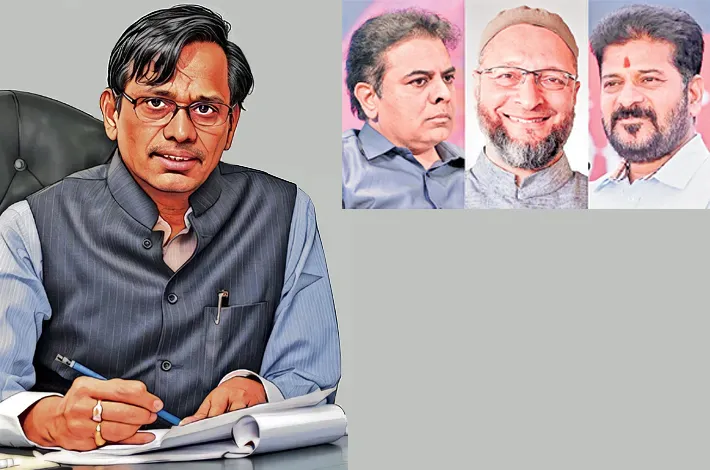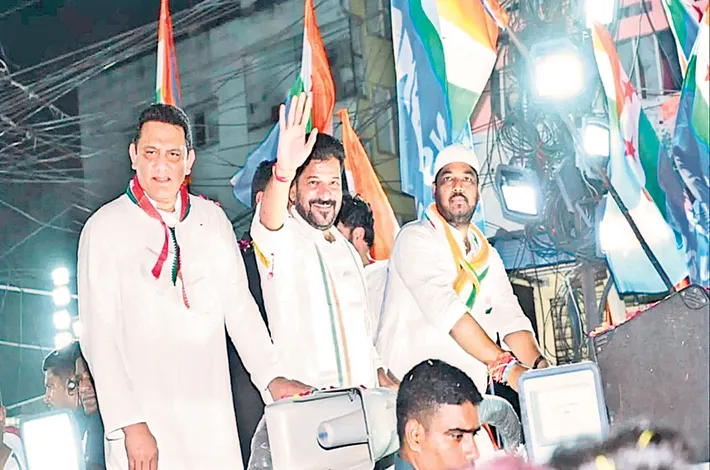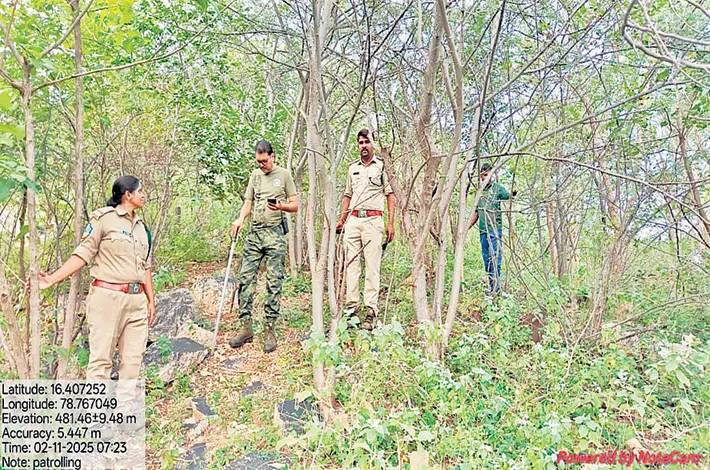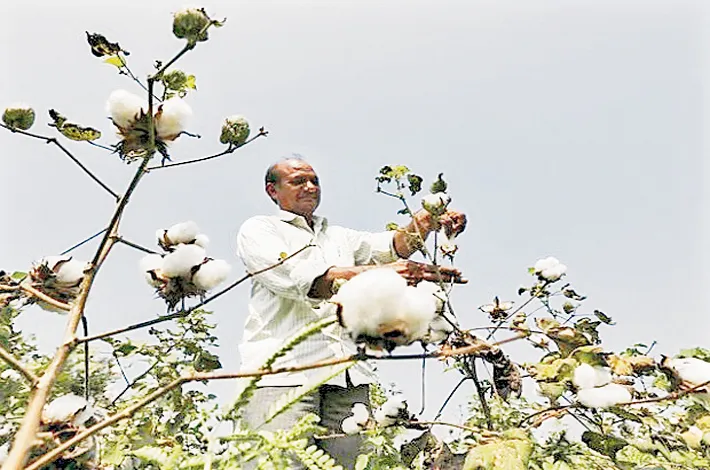A Recipe for Love
19-07-2025 12:00:00 AM
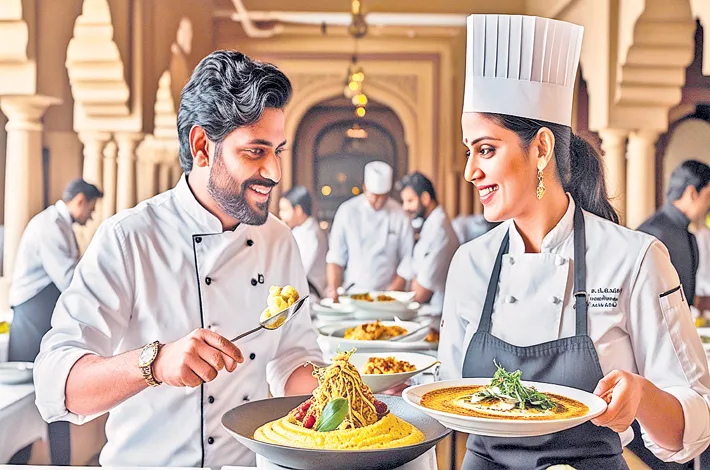
In the heart of Hyderabad’s bustling cosmopolitan sprawl, the opulent Mirage Hotel shimmered like a jewel under the Telangana sun. Its kitchens were a symphony of clanging pans, sizzling spices, and the hum of ambition. Here, two young chefs, Subramanian from Tamil Nadu and Kadambari Chatterjee from West Bengal, found themselves crafting not just exquisite dishes but an unexpected romance.
Subramanian, or Subbu as his colleagues called him, was a wiry man with a quiet intensity, his hands deftly shaping dosas and tempering spices for the hotel’s famed vegetarian thali. Hailing from Madurai, his culinary soul was rooted in Tamil tradition—crisp vadas, fragrant sambar, and coconut chutneys that sang of his homeland. His vegetarian creations were a revelation, drawing food critics and guests alike to the Mirage’s South Indian restaurant, Annapoorna. Subbu’s world was one of precision: every spice measured, every flame tamed. Yet, beneath his calm exterior, he carried a restless heart, yearning for something beyond the kitchen’s heat.
Kadambari, or Kadam as she preferred, was a force of nature. With her sharp wit and sharper knife skills, she ruled the hotel’s Bengali seafood haven, Macher Jhol. Raised in Kolkata, she had grown up by the Hooghly River, where fish was not just food but poetry. Her pomfret curries, mustard-drenched hilsa, and delicate fish fries were the talk of Hyderabad’s food scene. Kadam’s laughter filled the kitchen, her bangles clinking as she tossed spices into bubbling pots. But her confidence masked a quiet longing—for connection, for someone who could match her fire.
Their paths crossed during a chaotic Diwali banquet at the Mirage. The hotel was hosting a fusion food festival, and the executive chef had paired Subbu and Kadam to create a signature dish blending their specialties. Subbu, ever the purist, was skeptical. “Fish and vegetarian?” he muttered, adjusting his glasses. “What’s next, idli with ilish?”
Kadam, overhearing, smirked. “Scared, Subbu? My hilsa could make your dosa blush.”
Their first meeting sparked like cumin in hot oil. Subbu’s meticulous nature clashed with Kadam’s improvisational flair. He insisted on perfect measurements; she tossed in mustard seeds by instinct. Yet, as they worked late into the night, something shifted. Subbu watched, fascinated, as Kadam filleted a fish with the grace of a dancer. Kadam, in turn, marveled at Subbu’s ability to coax depth from humble lentils. By dawn, they had created a masterpiece: a vegetarian-fish fusion—crispy lotus stem fritters paired with a delicate mustard-fish broth, a dish that married Tamil restraint with Bengali boldness.
The festival was a triumph, and their dish was the star. Guests raved, critics swooned, and Subbu and Kadam found themselves stealing glances across the kitchen. Over the next few weeks, their rivalry softened into camaraderie. They began sharing recipes, stories, and late-night filter coffee in the hotel’s staff canteen. Subbu told Kadam about Madurai’s Meenakshi Temple, its towering gopurams etched in his memory. Kadam spoke of Durga Puja in Kolkata, the pandals glowing under monsoon skies. Hyderabad, with its blend of old-world charm and modern buzz, became their common ground.
One evening, after a grueling dinner service, Kadam found Subbu at the hotel’s rooftop garden, staring at the city’s twinkling skyline. “Tired of my fishy attitude already?” she teased, sitting beside him.
Subbu chuckled, his usual reserve melting. “I was thinking… your hilsa curry could use a hint of my coriander chutney.”
Kadam gasped, mock-offended. “Tamper with my hilsa? You’re brave, Subramanian.”
Their laughter faded into a comfortable silence, the kind that spoke louder than words. Subbu noticed the way Kadam’s eyes caught the city lights, and Kadam saw the gentleness in Subbu’s calloused hands. Without thinking, she reached for his hand, her bangles soft against his skin. He didn’t pull away.
Their romance bloomed quietly, like a slow-simmered curry. They explored Hyderabad together—wandering through Golconda Fort, sharing biryani at Bawarchi, and debating whether Hyderabadi haleem could rival Kolkata’s kathi rolls or Madurai’s jil jil jigarthanda. In the kitchen, they pushed each other to new heights. Subbu experimented with Kadam’s mustard pastes, creating a vegetarian shorshe paneer that stunned diners. Kadam, inspired by Subbu’s precision, crafted a fish dosa that became the Mirage’s signature.
But love, like any dish, wasn’t without its challenges. Subbu’s family, staunch vegetarians, disapproved of his relationship with a “fish-eating Bengali.” Kadam’s parents, proud of their Bengali roots, worried she was drifting too far from home. The weight of tradition pressed on them, and one night, after a heated phone call with her mother, Kadam broke down in the staff canteen. “They think I’m betraying who I am,” she whispered.
Subbu took her hand, his voice steady. “Kadam, we’re not betraying anyone. We’re creating something new—together. Like our lotus stem and hilsa.”
She smiled through her tears, and in that moment, they knew they’d fight for their love, just as they fought for perfection in their dishes.
Months later, at the Mirage’s annual gala, Subbu and Kadam unveiled a new menu—a love letter to their roots and their journey. It featured a vegetarian thali with a Bengali twist: tamarind-infused dal paired with a fish-inspired mustard sauce, and coconut rice flecked with shorshe. As guests applauded, Subbu caught Kadam’s eye across the room. She mouthed, “We did it.”
Later, under the stars on the rooftop, Subbu pulled Kadam close. “You know,” he said, “I never thought I’d fall for someone who smells like fish all the time.”
Kadam laughed, swatting his arm. “And I never thought I’d love a man who worships spinach.”
They kissed, the city sprawling beneath them, their love a fusion as bold and beautiful as the dishes they created. In Hyderabad’s melting pot, Subbu and Kadam had found not just each other but a recipe for a life where Tamil spices and Bengali fish could coexist, perfectly balanced, forever.





